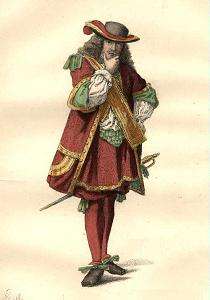The Misanthrope

« L’ami du genre humain n’est point du tout mon fait. »
The human race's friend is not the sort for me."—Alceste, Le Misanthrope
Le Misanthrope, ou l'Atrabilaire amoureux (The Misanthrope, or The Malcontent in Love) is a 1666 comedy of manners by Molière, written in the typical Alexandrine verse [1] of the French classical drama. Alceste, the title character, looks down on the society, believing it hypocritical and disdaining the false compliments which are considered polite. Unfortunately, the very qualities which are horrifying to him are exemplified in Célimène, the woman he loves.
Some Hilarity Ensues, but the play also seriously points out human flaws.
- Beta Couple: Philinte and Éliante
- Brutal Honesty: Alceste endorses and applies this, getting him in a lot of trouble
- Did Not Get the Girl
- Downer Ending
- Foil: Philinte for Alceste, Éliante for Célimène
- Grande Dame: The prude Arsinoé
- Hates Everyone Equally: Alceste
- Moral Guardian: Arsinoé
- No Ending: The play ends with all but one plot thread unresolved. Philant and Éliante get together, but Alceste and Célimène are still at odds, Alceste's case hasn't been resolved, and Alceste is still threatening to abandon society and live in isolation.
- Such a Phony: Célimène
- She accepts the advances of several men, and writes letters to them with notes on how stupid the other suitors are. This gets rubbed in her face in her final scene. As one translation gives it (from memory, possibly not word-for-word correct):
And so, had you but spoken from the heart,
Rejected my advances from the start,
I'd have no quarrel; or, at any rate
I could complain of nothing but my fate.
But oh! So falsely to encourage me!
- Those Two Guys: Acaste and Clitandre.
- ↑ a line of twelve syllables, with a strong caesura (or pause) in the middle, roughly equivalent to the English iambic hexameter